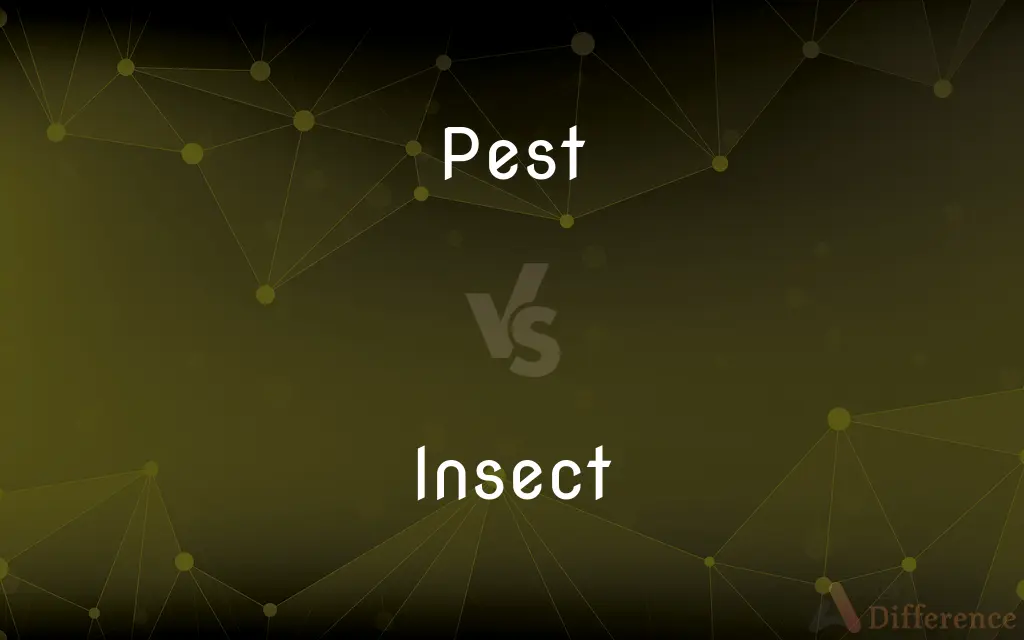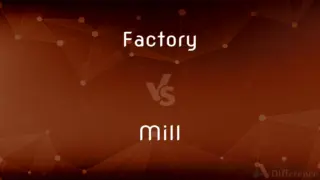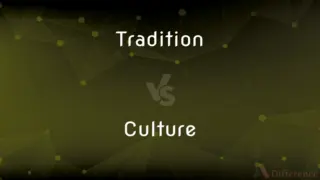Pest vs. Insect — What's the Difference?
By Tayyaba Rehman — Updated on September 20, 2023
A Pest is an organism, often an insect, that causes harm or nuisance to humans, crops, or livestock. An Insect is a specific type of arthropod characterized by a chitinous exoskeleton, a three-part body, and three pairs of jointed legs.

Difference Between Pest and Insect
Table of Contents
ADVERTISEMENT
Key Differences
A Pest is generally an organism that negatively affects human activities, often by damaging crops, homes, or spreading disease. An Insect, on the other hand, is a specific class of arthropods with certain biological characteristics like six legs and a segmented body. While all insects are not pests, some pests are indeed insects.
Pests are not limited to the insect world; they can also be rodents, birds, or even microorganisms. Insects are a broad biological classification that includes various families and species, many of which are not pests. In this sense, the term Pest is more about the role an organism plays in human life, whereas Insect is a taxonomic term.
The term Pest is often used in the context of agriculture, public health, or home maintenance. Insects can be found in various contexts including scientific research, ecology, and natural biodiversity. Pests are generally unwanted, while insects can be either beneficial or neutral in their effects on human activities.
Pest management often involves the control or elimination of organisms classified as pests, which sometimes includes insects. Insect study, known as entomology, explores the wide array of insect species, only some of which are considered pests. Thus, while Pest is a term defined by human inconvenience, Insect is a scientific classification.
Comparison Chart
Definition
Organism causing harm
Class of arthropods
ADVERTISEMENT
Context
Agriculture, health
Biology, ecology
Taxonomic Scope
Not specific to taxonomy
Specific taxonomic class
Role
Always negative
Can be neutral or positive
Types Included
Insects, rodents, etc.
Only six-legged arthropods
Compare with Definitions
Pest
A spreader of diseases.
Mosquitoes are pests that can transmit malaria.
Insect
A subject of entomological study.
The butterfly is an interesting insect to entomologists.
Pest
A damaging force in an ecosystem.
Invasive species are often considered pests.
Insect
A pollinator of plants.
Bees are insects that help in pollination.
Pest
An annoying person or thing.
He is such a pest, always bothering me.
Insect
A small, often winged, creature.
The ladybug is a beneficial insect.
Pest
A nuisance in households.
Ants became a pest in my kitchen.
Insect
A decomposer in ecosystems.
Certain insects play a key role in decomposition.
Pest
An organism harmful to crops.
The locust is a notorious pest in agriculture.
Insect
Insects or Insecta (from Latin insectum) are pancrustacean hexapod invertebrates and the largest group within the arthropod phylum. Insects have a chitinous exoskeleton, a three-part body (head, thorax and abdomen), three pairs of jointed legs, compound eyes and one pair of antennae.
Pest
An annoying person or thing; a nuisance.
Insect
A small arthropod animal that has six legs and generally one or two pairs of wings
Insect pests
Pest
An organism, typically an insect, that sickens or annoys humans, hampers human activities, damages crops or food products, harms livestock, or causes damage to buildings.
Insect
Any of numerous arthropod animals of the class Insecta, having an adult stage characterized by three pairs of legs and a body segmented into head, thorax, and abdomen and usually having one or two pairs of wings. Insects include the flies, crickets, mosquitoes, beetles, butterflies, and bees.
Pest
A deadly epidemic disease; a pestilence.
Insect
Any of various other small, chiefly arthropod animals, such as spiders, centipedes, or ticks, usually having many legs. Not in scientific use.
Pest
A pestilence, i.e. a deadly epidemic, a deadly plague.
Insect
An insignificant or contemptible person.
Pest
Any destructive insect that attacks crops or livestock; an agricultural pest.
Insect
An arthropod (in the Insecta class) characterized by six legs, up to four wings, and a chitinous exoskeleton.
Our shed has several insect infestions, including ants, yellowjackets, and wasps.
Pest
An annoying person, a nuisance.
Insect
(colloquial) Any small arthropod similar to an insect, including spiders, centipedes, millipedes, etc.
The swamp is swarming with every sort of insect.
Pest
An animal regarded as a nuisance, destructive, or a parasite, vermin.
Insect
(derogatory) A contemptible or powerless person.
The manager’s assistant was the worst sort of insect.
Pest
An invasive weed.
Insect
One of the Insecta; esp., one of the Hexapoda. See Insecta.
Pest
A fatal epidemic disease; a pestilence; specif., the plague.
England's sufferings by that scourge, the pest.
Insect
Any air-breathing arthropod, as a spider or scorpion.
Pest
Anything which resembles a pest; one who, or that which, is troublesome, noxious, mischievous, or destructive; a nuisance.
Insect
Any small crustacean. In a wider sense, the word is often loosely applied to various small invertebrates.
Pest
A persistently annoying person
Insect
Fig.: Any small, trivial, or contemptible person or thing.
Insect
Of or pertaining to an insect or insects.
Insect
Like an insect; small; mean; ephemeral.
Insect
Small air-breathing arthropod
Insect
A person who has a nasty or unethical character undeserving of respect
Insect
A six-legged arthropod.
A spider is not an insect because it has eight legs.
Common Curiosities
What is an Insect?
An Insect is a six-legged arthropod with a segmented body.
What is a Pest?
A Pest is an organism that causes harm or inconvenience to humans or their environments.
Can a Pest also be beneficial?
Generally no; by definition, a Pest has a negative impact.
Are all Pests Insects?
No, pests can also be rodents, birds, or microorganisms.
Are all Insects Pests?
No, many insects are beneficial or neutral to human activities.
What roles do Insects play in ecosystems?
Insects can be pollinators, decomposers, and food for other animals.
How are Pests generally managed?
Pests are often managed through chemical, biological, or physical means.
What is the study of Insects called?
The study of insects is called entomology.
Is the term Pest scientifically defined?
No, "Pest" is defined more by its impact on human activities.
Is the term Insect scientifically defined?
Yes, Insects are a specific taxonomic class within the arthropods.
What are common examples of Pests?
Examples include mosquitoes, rats, and cockroaches.
Share Your Discovery

Previous Comparison
Factory vs. Mill
Next Comparison
Tradition vs. CultureAuthor Spotlight
Written by
Tayyaba RehmanTayyaba Rehman is a distinguished writer, currently serving as a primary contributor to askdifference.com. As a researcher in semantics and etymology, Tayyaba's passion for the complexity of languages and their distinctions has found a perfect home on the platform. Tayyaba delves into the intricacies of language, distinguishing between commonly confused words and phrases, thereby providing clarity for readers worldwide.














































